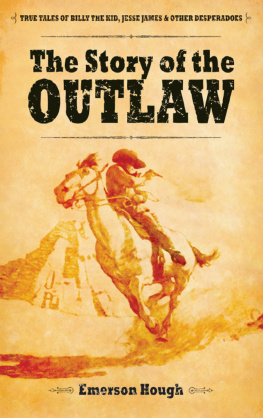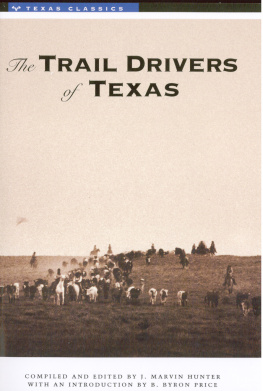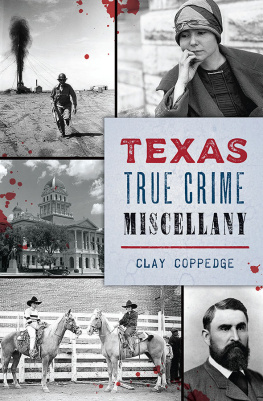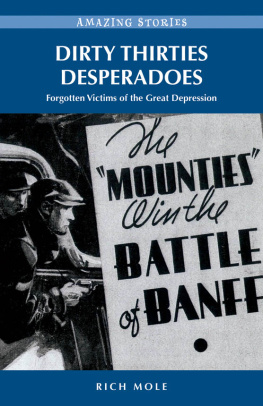Haile - Texas Depression-era Desperadoes (True Crime)
Here you can read online Haile - Texas Depression-era Desperadoes (True Crime) full text of the book (entire story) in english for free. Download pdf and epub, get meaning, cover and reviews about this ebook. year: 2014, publisher: Arcadia Publishing Inc., genre: Non-fiction. Description of the work, (preface) as well as reviews are available. Best literature library LitArk.com created for fans of good reading and offers a wide selection of genres:
Romance novel
Science fiction
Adventure
Detective
Science
History
Home and family
Prose
Art
Politics
Computer
Non-fiction
Religion
Business
Children
Humor
Choose a favorite category and find really read worthwhile books. Enjoy immersion in the world of imagination, feel the emotions of the characters or learn something new for yourself, make an fascinating discovery.

- Book:Texas Depression-era Desperadoes (True Crime)
- Author:
- Publisher:Arcadia Publishing Inc.
- Genre:
- Year:2014
- Rating:4 / 5
- Favourites:Add to favourites
- Your mark:
- 80
- 1
- 2
- 3
- 4
- 5
Texas Depression-era Desperadoes (True Crime): summary, description and annotation
We offer to read an annotation, description, summary or preface (depends on what the author of the book "Texas Depression-era Desperadoes (True Crime)" wrote himself). If you haven't found the necessary information about the book — write in the comments, we will try to find it.
Haile: author's other books
Who wrote Texas Depression-era Desperadoes (True Crime)? Find out the surname, the name of the author of the book and a list of all author's works by series.
Texas Depression-era Desperadoes (True Crime) — read online for free the complete book (whole text) full work
Below is the text of the book, divided by pages. System saving the place of the last page read, allows you to conveniently read the book "Texas Depression-era Desperadoes (True Crime)" online for free, without having to search again every time where you left off. Put a bookmark, and you can go to the page where you finished reading at any time.
Font size:
Interval:
Bookmark:
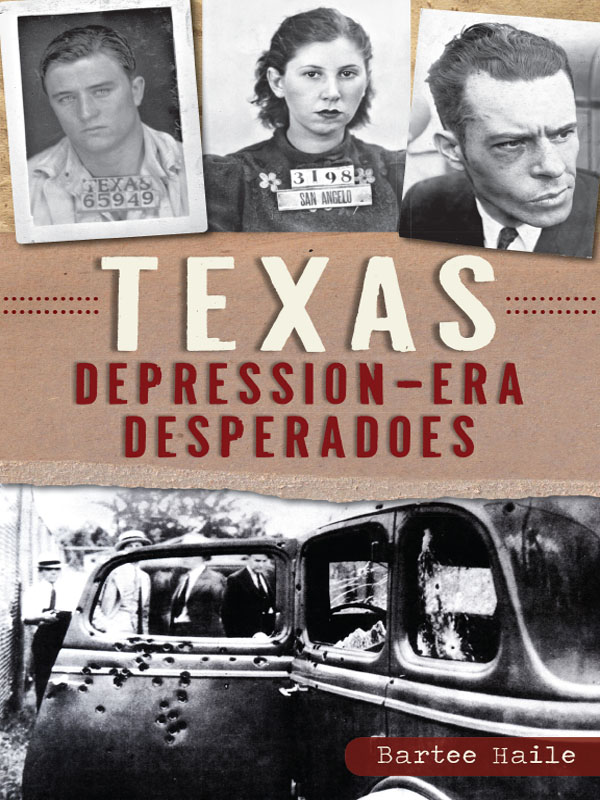


Published by The History Press
Charleston, SC 29403
www.historypress.net
Copyright 2014 by Bartee Haile
All rights reserved
Front cover, top, left to right : Henry Methvin. Courtesy of Texas/Dallas History and Archives Division, Dallas Public Library ; Marie Barrow. Courtesy of Houston Public Library HMRC ; Harry McCormick with black eye. Courtesy of Houston Public Library HMRC ; bottom : Bonnie and Clyde death car.
First published 2014
e-book edition 2014
ISBN 978.1.62584.703.4
Library of Congress Cataloging-in-Publication Data
Haile, Bartee, 1945
Texas depression-era desperadoes / Bartee Haile.
pages cm. -- (True crime)
Includes bibliographical references and index.
print edition ISBN 978-1-62619-227-0 (pbk.)
1. Texas--History--1846-1950. 2. Crime--Texas--History--20th century. 3. Outlaws--Texas--Biography. 4. Texas--Biography. 5. Barrow, Clyde, 1909-1934. I. Title.
F391.H145 2014
976.405--dc23
2013046010
Notice : The information in this book is true and complete to the best of our knowledge. It is offered without guarantee on the part of the author or The History Press. The author and The History Press disclaim all liability in connection with the use of this book.
All rights reserved. No part of this book may be reproduced or transmitted in any form whatsoever without prior written permission from the publisher except in the case of brief quotations embodied in critical articles and reviews.
For Gerri, a wonderful wife and the love of my life
Contents
Introduction
Over the years, I have lost count of the number of times someone has asked, When are you going to write a book? My stock answer was something along the lines of, When I find a subject worth writing about that has not been written to death. After all, I usually added, there are more than enough biographies of Sam Houston and rehashes of the Alamo. Until then, I would be perfectly happy turning out my newspaper column, This Week in Texas History.
Then one day in the winter of 2013, I received an e-mail from Christen Thompson asking if I might be interested in writing a book for The History Press. That got me to thinking, and to make a long story short, Texas Depression-Era Desperadoes is the end result.
Why a book about Texas outlaws of the 1930s? First and foremost, it was a fundamentally different time that produced a fundamentally different kind of lawbreaker. The Great Depression was an economic and social calamity the likes of which present-day Americans cannot comprehend. Millions had no roofs over their heads, no means of support and no idea where their next meal was coming from. There was no safety net, and people kept falling until they hit rock bottom.
My maternal grandfather was one of those unfortunate individuals. He owned a small fleet of taxicabs in Big Spring, Texas, until he lost everything in the Crash of 29. Daddy Jeffers (thats what I grew up calling him) walked the seventy-odd miles from Big Spring to Lubbock in search of work. For the rest of his life, he drove a cab around the streets of Lubbock from sundown to sunrise five, six and sometimes seven nights a week. And, yes, I am sure the irony was not lost on him.
Well, you could say, your grandfather found a way to survive the Depression without stealing and killing, and the criminals of that period could have too. Quite true, but thats not the point, is it? Each and every outlaw had his or her own personal reasons for turning to a life of crime, and that is what this book is all about.
If the characters in Texas Depression-Era Desperadoes break out of the one-dimensional stereotype in which they are so often trapped and spring to life as flesh-and-blood beings, I accomplished what I set out to do. And if you enjoy reading their stories, thats even better.
Chapter 1
West Dallas
WHERE THE WILD WEEDS GREW
If Clyde Barrow and the other Depression-era desperadoes who gave lawmen fits and took fellow Texans minds off the hard times were to return on a day pass from the hereafter to the scene of their crimes, they would not recognize present-day Texas. But to understand the generation of young outlaws that ran wild in the Lone Star State during the 1930s, you must take a hard look at the Texas of their birth and upbringing.
Texas in 1910, the year Clyde Chestnut Barrow was born at a wide spot in the road south of Dallas, was a rural state of just under 4 million with four out of five living on small farms or in towns with populations under 2,500. Texas would, in fact, remain a majority rural state until the census of 1950.
Compare the Texas of 1910 with Texas exactly a century later. Today there are twenty-five million inhabitants, with three out of four residing in the Big Triangle formed by the DallasFort Worth Metroplex at the northern apex; Houston, the fourth largest city in the United States, at the southeastern point; and San AntonioAustin at the southwestern point.
Bonnie, Clyde and the rest of the colorful cast would be lost in this congested urban sprawl, but they would feel right at home in the sparsely settled countryside. Out in those wide-open spaces, there are still plenty of places to hide from twenty-first-century crime fighters in spite of all their newfangled technology.
In December 1891, Henry Barrow, a native of Florida who migrated to East Texas by way of Arkansas, made Cumie Walker, a local girl, his wife. Both were sixteen, marrying age at the time. Henry, who had seen the inside of a classroom for less than a full day in his whole life, could neither read nor write. Cumie, on the other hand, had attended school on a regular basis for a number of years and would insist upon their children learning the three Rs.
Soon after tying the knot, Henry quit his job at a Nacogdoches sawmill to chase the dream that would haunt him for the next thirty years. He rented several acres in the woods outside town, and the young couple started raising crops and having childrenfuture free labor so essential to family farming. It never occurred to Henry to do anything else. He was, after all, following in the footsteps of his widowed father, who had put food on the table and clothes on the backs of his two sons by scratching out a living on someone elses land. What Henry had no way of knowing was that he had grown up seeing tenant farming at its best. But in the decades to come, he would experience the worst of a system that was a cruel suckers bet, pure and simple.
In the economic aftermath of the Civil War, plantation owners across the Old South and in Texas, the westernmost member of the conquered Confederacy, were hard pressed to replace the emancipated slaves with the cheapest possible labor. They devised the fiendishly clever system of so-called tenant farming that tempted poor whites and poorer blacks with a pie-in-the-sky promise that never came true. As it evolved in Texas in the last third of the nineteenth century, tenant farming came in two flavors: share tenant and sharecropper. The share tenant supplied everything he needed (livestock, implements, feed, seed, whatever) to plant and harvest a crop, usually cotton. A third or a fourth of the crop went to the absentee landlord, and the farmer kept the rest for himself. The sharecropper, by comparison, brought nothing to the arrangement but the sweat of his brow. He was strictly hired help whose compensation was a portion or sharehence the nameof the crop, significantly smaller than the share tenants. Both types of tenant farmers were at the mercy of the elements and the market. Drought, boll weevils, hailstorms and other natural disasters often left them with nothing to take to market. In those cases, they were compelled to borrow money at exorbitant interest rates, sometimes as high as 100 percent or more, to keep from starving and survive until the next planting.
Font size:
Interval:
Bookmark:
Similar books «Texas Depression-era Desperadoes (True Crime)»
Look at similar books to Texas Depression-era Desperadoes (True Crime). We have selected literature similar in name and meaning in the hope of providing readers with more options to find new, interesting, not yet read works.
Discussion, reviews of the book Texas Depression-era Desperadoes (True Crime) and just readers' own opinions. Leave your comments, write what you think about the work, its meaning or the main characters. Specify what exactly you liked and what you didn't like, and why you think so.

